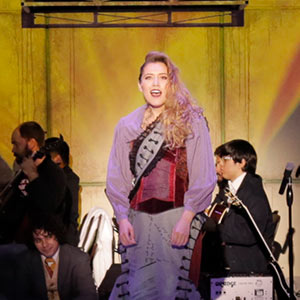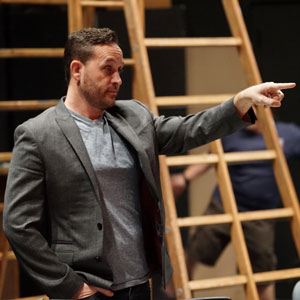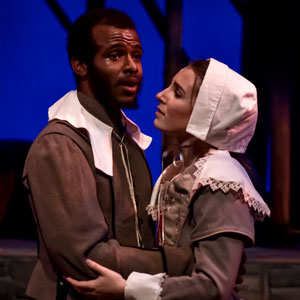Cast Finds the Yucks in Fine 'Forum'
— Los Angles Times - Daryl H. Miller - Friday, August 8th, 1997FULLERTON — The casting requirements for "A Funny Thing Happened on the Way to the Forum" are pretty stiff. The lead actor needs the old-fashioned comic timing of a Zero Mostel or Phil Silvers. His reluctant partner in mischief must be a guy who looks perfectly awful in a dress (well, maybe that isn't so difficult). The three all-purpose supernumeraries must have the dexterity of Olympic gymnasts. The chorus girls must have bodies like Greek statues, and the guys must have Roman hands.
OK, OK, bad pun. But you're going to have to steel yourself for worse if you're going to see this musical at the Muckenthaler Cultural Center's Dinner Theatre on the Green. It's a faux Roman comedy with a vaudevillian soul, and the one-liners are guaranteed to produce as many groans as giggles.
This outdoor production, an outgrowth of the Fullerton College theater arts department, fills most of the casting requirements. Though these performers won't make anyone forget the stars of the 1962 original (including Mostel) or the 1996 Broadway revival (with Nathan Lane), they nevertheless put across a vocally assured, solidly acted show.
Inspired by the plays of Plautus, some of the oldest remaining comedies from the ancient world, "Forum" is a fairly mindless series of comic complications involving beautiful young lovers, silly old lechers, vainglorious soldiers and crafty slaves. Television writers Burt Shevelove and Larry Gelbart collaborated on the farcical, joke-strewn script, and Stephen Sondheim composed the music--the first Broadway score for which he wrote both words and music.
The plot focuses on Pseudolus, a Roman slave who--like most slave characters in ancient comedies--is smarter than anyone else around. When his young master is smitten with a courtesan at the house of flesh next door, Pseudolus devises an elaborate plot to bring the two together, in exchange for his freedom.
In this production, director Gary Krinke and his performers haven't come up with quite enough comic business to send the enterprise to the far reaches of hysteria, as a farce such as this demands. Neither do they perform it at the tape-on-fast-forward speed required. But they come pretty close.
Richard Blake, in the Mostel role of Pseudolus, looks like a more rotund version of Jay Leno and commands a fairly extensive vocabulary of physical comedy--witness his poses mimicking the erotic pottery in fellow slave Hysterium's possession. Yet even here, he doesn't cut loose with enough abandon.
As Hysterium, whose nervousness matches his name, Kyle Myers is a laugh riot of popping eyes and high-pitched squeaks of terror. Bob May has a vaudevillian's timing as Hero's father, Senex, and, in her too-few moments onstage, Jo Monteleone is a stitch as Domina, the domineering mother-wife (with Bride of Frankenstein gray streaks in her hair) who glowers like Medusa one moment and comes on like a courtesan the next.
Frank Romero sings gloriously as sweet, earnest Hero, and Patrick Munoz struts and blusters humorously as Miles Gloriosus, the braggart and warrior who buys Hero's beloved. Greg Habelow, Sergio Lobito and Mark Phillips tumble and caper skillfully as the all-purpose Proteans (a complicated football-referee-like salute as Miles' foot soldiers is knee-slapping), and the stunning courtesans can look forward to careers in Las Vegas (or, perhaps, "Showgirls II").
Mostly, the show is an accumulation of moments: Pseudolus dancing a few steps with a courtesan and then twirling her into a wall; Miles drawing his sword and pausing to admire his looks in its reflection; Pseudolus skipping across the stage, pinwheel in hand, trailed by the three Roman soldiers assigned to follow him, doing the same; Domina pawing a panic-stricken Hysterium while accusing her husband of doing the same with a courtesan; and more.
John Vaughn's choreography (which, like much of this staging, echoes more famous productions) provides the requisite frolicking and shimmying, and Mela Hoyt-Heydon's costumes put the courtesans in coyly revealing attire and the leggiest men in Roman-era miniskirts.








